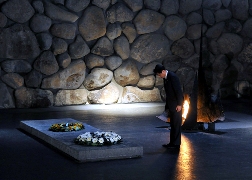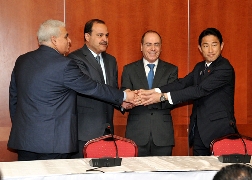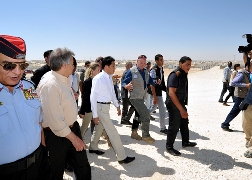Countries & Regions
Visit to the Middle East by Foreign Minister Kishida (Israel, Palestine and Jordan)



Overview of the Itinerary (July 24-26)
- (1) Israel
- July 24:
Courtesy call on President Shimon Peres, talks with Justice Minister Tzipi Livni (in charge of peace process with Palestine) and Regional Cooperation Minister Silvan Shalom, visit to Yad Vashem (the Holocaust Memorial Museum) and courtesy call on Prime Minister and Foreign Minister Benjamin Netanyahu.
- (2) Palestine
- July 24:
Talks with Foreign Minister Riyad al-Maliki, courtesy call on President Mahmoud Abbas, exchange of notes on Japan's provision of Non-Project Grant Aid and dinner with President Abbas.
- (3) Israel/Palestine
- July 25:
Visit to the Old City of Jerusalem, talks with Dr. Sa’eb Erekat, head the Negotiations Affairs Department of the PLO, hosting the Fourth Ministerial-Level Meeting of the Four-Party Consultative Unit for the “Corridor for Peace and Prosperity” initiative and visit to the Jericho Agro-Industrial Park (JAIP).
- (4) Jordan
- July 25:
Audience with King Abdullah II, courtesy call on Prince Hassan (former Crown Prince), talks with Foreign Minister Nasser Judeh (the sixth foreign minister-level policy consultations), courtesy call on Prime Minister Abdullah Ensour and dinner with Foreign Minister Judeh.
- July 26:
Visit to the Zaatari Syrian refugee camp and talks with United Nations High Commissioner for Refugees Antonio Guterres.
Achievements of the Visit
(1) Contribution to Regional Stability
Middle East Peace: Appeals for Resumption of Peace Negotiations
- Amid positive moves toward the resumption of peace negotiations, thanks to the mediation efforts made by the United States, Fumio Kishida, Minister for Foreign Affairs of Japan, asked both Israel and Palestine to hold sincere talks and negotiations.
- Minister Kishida strongly urged both Israel and Palestine to refrain from taking any unilateral action that may harm the environment for the resumption and progress of the peace negotiations. Specifically, he appealed to Israel to freeze settlement activities and to Palestine to abstain from newly seeking membership of international organizations and participation in international agreements.
- Minister Kishida then conveyed to them that Japan is ready to provide support for successful talks in both political and economic ways. He also expressed Japan's intention to continue and further strengthen its assistance to Palestine in order to help create an environment for the achievement of peace through a two-state resolution by pushing ahead with the "Corridor for Peace and Prosperity" initiative and the Conference on Cooperation among East Asian Countries for Palestinian Development (CEAPAD).
- In this regard, Minister Kishida said Japan plans to double the number of people invited to Japan under the Joint Invitation Program for Israeli and Palestinian Youth Leaders in order to promote confidence building between the two parties.
- Both Israel and Palestine highly appreciated Japan's contribution to Middle East peace and made positive remarks saying that they will work seriously for the achievement of peace.
"Corridor for Peace and Prosperity" Initiative: Ministerial-Level Meeting of Four-Party Consultative Unit (Morning of July 25)
Participants: Regional Cooperation Minister Silvan Shalom (Israel), Mohammad Abu Ramadan State Minister for Planning Affairs (Palestine) and Interior Minister Hussein Hazza' Al-Majali (Jordan)
- Minister Kishida held a Ministerial-Level Meeting of Four-Party Consultative Unit for the "Corridor for Peace and Prosperity" initiative, the meeting for the first time in about five years, inviting ministers from Israel, Palestine and Jordan. In a friendly atmosphere, the four ministers discussed their respective efforts and positions on the initiative's progress.
After the talk, they announced the achievements of the meeting as a chairman's summary, outlined as follows:
1. The ministers reconfirmed the importance of the initiative in realizing peace through a two-state solution.
2. They welcomed the progress toward the initiation of operations at the Jericho Agro- Industrial Park (JAIP).
3. They agreed to accelerate their cooperation for the early implementation of the agreements on JAIP.
4. They agreed to start discussing a new project under the initiative after JAIP.
- Amid moves toward the resumption of peace negotiations, it was timely that the ministers of both Israel and Palestine met in Palestine face to face, together with the Jordanian minister, and committed themselves to working together on a single project. The meeting was significant from the perspectives of promoting the peace process and, at the same time, strengthening Japan's international presence.
Visit to Syrian Refugee Camp (Morning of July 26) and Assistance to Jordan: Japan's Humanitarian Assistance and Other Contributions
- In his talks with the government leaders, Minister Kishida expressed his deep concern that the deterioration of the Syrian situation would worsen the humanitarian situations and destabilize the whole region. He introduced Japan's assistance for the Syrian humanitarian crisis through international organizations and non-governmental organizations (NGOs), which is worth some 95 million U.S. dollars and of which 37 million dollars was for Jordan.
- During his talks with the Jordanian leaders, Minister Kishida highly appraised the Jordanian government's efforts to accept massive numbers of Syrian refugees despite its heavy economic burdens. He told them that the Japanese government is providing assistance to help alleviate Jordan's burdens, including a yen credit of 12 billion yen.
- Minister Kishida was briefed on the refugee situation and other related problems by United Nations High Commissioner for Refugees Antonio Guterres, who visited Jordan to accompany him on his visit to the refugee camp. Minister Kishida visited the Zaatari camp, one of the largest Syrian refugee camps in Jordan, and offered encouragement to the members of Japanese NGOs.
(2) Strengthening Bilateral Relations
During Minister Kishida's visit to the Middle East, Japan was able to confirm the commitment of Israel, Palestine and Jordan to further strengthening their bilateral relationships with Japan at a high level, through his audiences and courtesy calls with heads of states as well as in talks with his counterparts. In the respective bilateral relations, Minister Kishida had significant exchanges of views on the following:
Israel
Minister Kishida invited Prime Minister Netanyahu to visit Japan. Prime Minister Netanyahu showed strong eagerness to do this and invited Prime Minister Shinzo Abe to visit Israel. Japan and Israel agreed to further reinforce the framework of dialogue between the two countries, in the areas including public relations, security and international law as well as between experts in the field of space, and to promote cooperation in science and technology, in which both countries are advanced.
Palestine
Minister Kishida signed exchange of notes on Japan's provision of Non-Project Grant Aid of 800 million yen to the Palestinian Authority and expressed Japan's intention to maintain and further strengthen its assistance to Palestine. As for the Conference on Cooperation among East Asian Countries for Palestinian Development (CEAPAD), he explained Japan's efforts and policy, including the schedule of related meetings in the future.
Jordan
The Jordanian side expressed King Abdullah II's hope to visit Japan, which Minister Kishida welcomed. Minister Kishida exchanged views with Jordanian leaders on the bilateral relation and the regional situation, including Jordan's plan to build a nuclear power plant.
(END)


